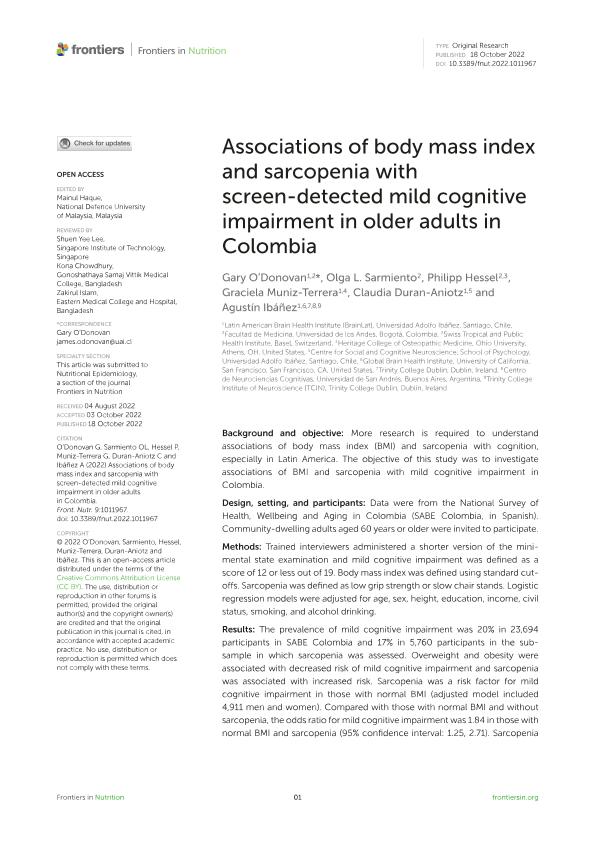Artículo
Associations of body mass index and sarcopenia with screen-detected mild cognitive impairment in older adults in Colombia
O’Donovan, Gary; Sarmiento, Olga L.; Hessel, Philipp; Muniz Terrera, Graciela; Duran Aniotz, Claudia; Ibañez, Agustin Mariano

Fecha de publicación:
10/2022
Editorial:
Frontiers Media
Revista:
Frontiers in Nutrition
ISSN:
2296-861X
Idioma:
Inglés
Tipo de recurso:
Artículo publicado
Clasificación temática:
Resumen
Background and objective: More research is required to understand associations of body mass index (BMI) and sarcopenia with cognition, especially in Latin America. The objective of this study was to investigate associations of BMI and sarcopenia with mild cognitive impairment in Colombia. Design, setting, and participants: Data were from the National Survey of Health, Wellbeing and Aging in Colombia (SABE Colombia, in Spanish). Community-dwelling adults aged 60 years or older were invited to participate. Methods: Trained interviewers administered a shorter version of the mini-mental state examination and mild cognitive impairment was defined as a score of 12 or less out of 19. Body mass index was defined using standard cut-offs. Sarcopenia was defined as low grip strength or slow chair stands. Logistic regression models were adjusted for age, sex, height, education, income, civil status, smoking, and alcohol drinking. Results: The prevalence of mild cognitive impairment was 20% in 23,694 participants in SABE Colombia and 17% in 5,760 participants in the sub-sample in which sarcopenia was assessed. Overweight and obesity were associated with decreased risk of mild cognitive impairment and sarcopenia was associated with increased risk. Sarcopenia was a risk factor for mild cognitive impairment in those with normal BMI (adjusted model included 4,911 men and women). Compared with those with normal BMI and without sarcopenia, the odds ratio for mild cognitive impairment was 1.84 in those with normal BMI and sarcopenia (95% confidence interval: 1.25, 2.71). Sarcopenia was also a risk factor in those with obesity but did not present a greater risk than sarcopenia alone. Compared with those with normal BMI and without sarcopenia, the odds ratio was 1.62 in those with obesity and sarcopenia (95% confidence interval: 1.07, 2.48). Sarcopenia was not a risk factor for mild cognitive impairment in those with overweight. Similar results were observed when reference values from Colombia were used to set cut-offs for grip strength. Similar results were also observed in cross-validation models, which suggests the results are robust. Conclusion: This is the first study of the combined associations of sarcopenia and obesity with cognition in Colombia. The results suggest that sarcopenia is the major predictor of screen-detected mild cognitive impairment in older adults, not overweight or obesity.
Palabras clave:
COGNITION
,
OBESITY
,
OVERWEIGHT
,
SARCOPENIA
,
SOUTH AMERICA
Archivos asociados
Licencia
Identificadores
Colecciones
Articulos(SEDE CENTRAL)
Articulos de SEDE CENTRAL
Articulos de SEDE CENTRAL
Citación
O’Donovan, Gary; Sarmiento, Olga L.; Hessel, Philipp; Muniz Terrera, Graciela; Duran Aniotz, Claudia; et al.; Associations of body mass index and sarcopenia with screen-detected mild cognitive impairment in older adults in Colombia; Frontiers Media; Frontiers in Nutrition; 9; 10-2022; 1-10
Compartir
Altmétricas



